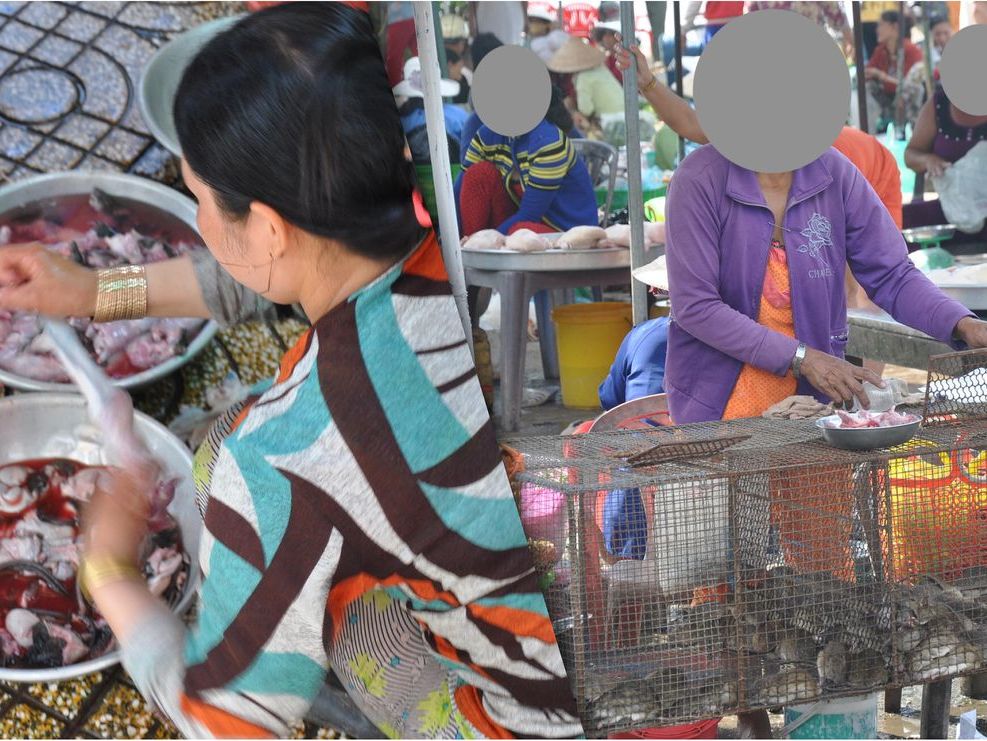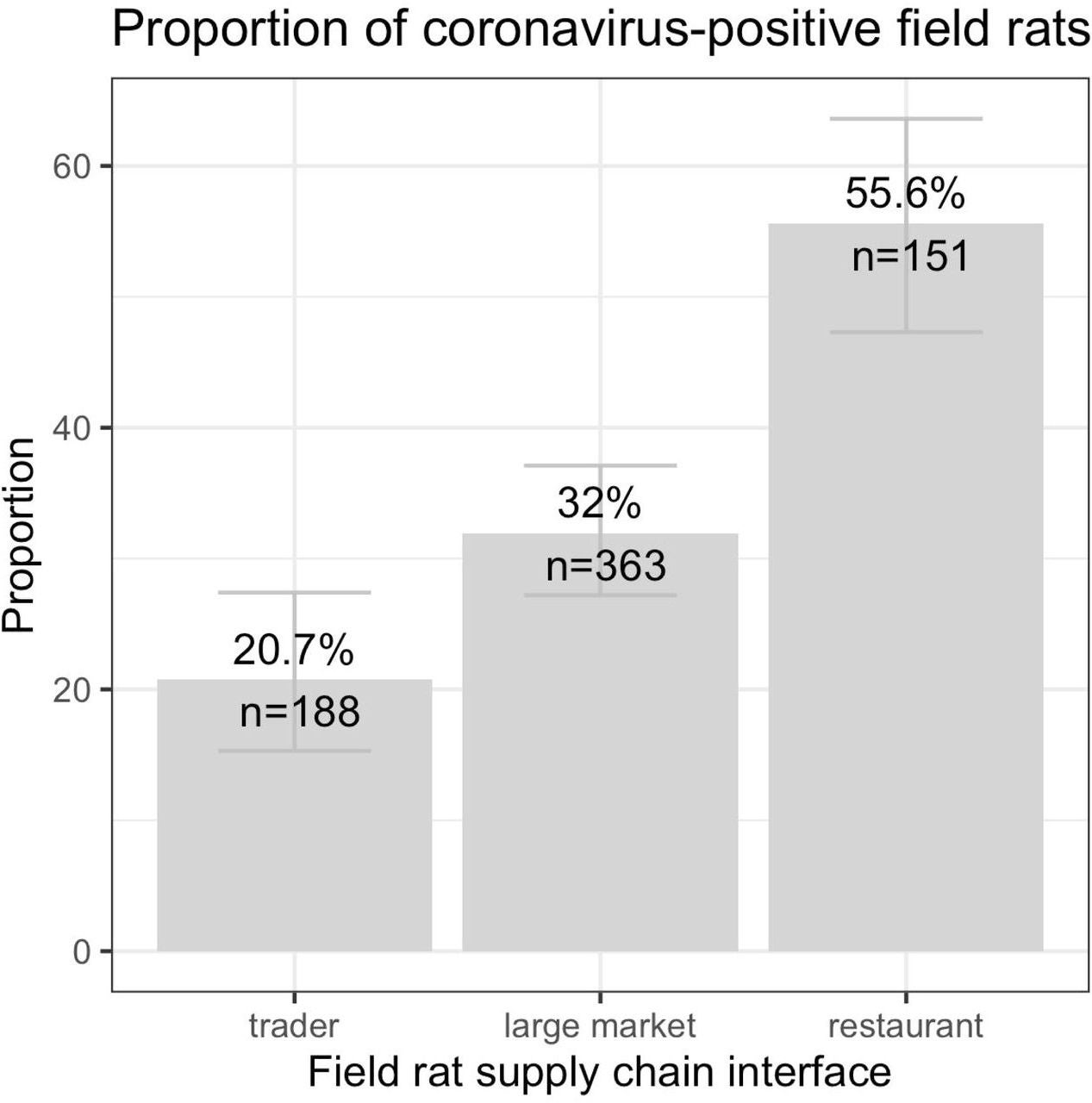Risk of coronaviruses increases as wildlife moves from farms to restaurants, study finds
The seven-year project in Vietnam found that by the time field rats bred for consumption reach restaurants, more than half have a coronavirus

Your support helps us to tell the story
From reproductive rights to climate change to Big Tech, The Independent is on the ground when the story is developing. Whether it's investigating the financials of Elon Musk's pro-Trump PAC or producing our latest documentary, 'The A Word', which shines a light on the American women fighting for reproductive rights, we know how important it is to parse out the facts from the messaging.
At such a critical moment in US history, we need reporters on the ground. Your donation allows us to keep sending journalists to speak to both sides of the story.
The Independent is trusted by Americans across the entire political spectrum. And unlike many other quality news outlets, we choose not to lock Americans out of our reporting and analysis with paywalls. We believe quality journalism should be available to everyone, paid for by those who can afford it.
Your support makes all the difference.A new study of the wildlife trade in Vietnam has found the risk of coronaviruses increases as animals move along the supply chain, from farms to markets before ending up in restaurants.
Researchers found coronaviruses in field rats, eaten widely across the region, increased at each step.
Some 20% of rats caught in the wild tested positive for at least one of six different coronaviruses, increasing to 32% at large wildlife markets and 55% at restaurants.
It is a startling discovery that suggests about half of diners were consuming a field rat infected with a coronavirus.
More surprising still is the fact that the project, aiming to better understand different coronaviruses and how they might spread in bats and other wildlife, began seven years ago.
In the wake of the Covid-19 pandemic, the evidence adds to urgent public health concerns that the wildlife trade and markets are settings for viruses to “jump” between species and people.
Covid-19 is among the deadliest pandemics in modern history and although its exact origins are yet unknown, scientists agree that it is a zoonotic disease which can spread between animals and humans.
The Independent’s Stop The Wildlife Trade campaign was launched by its proprietor Evgeny Lebedev to call for an end to high-risk wildlife markets and for an international effort to regulate the illegal trade in wild animals to reduce our risk of future pandemics.
The recently-published research was undertaken following disease outbreaks in Asia, including the 2003 SARS epidemic, a viral respiratory illness caused by a coronavirus.
Dr Sarah H Olson, an epidemiologist with the Wildlife Conservation Society (WCS) who led the study, told The Independent: “It was a bit of a surprise when I started crunching the data and saw just how significant the amplification process was.”
On one hand, she said, it was classic disease ecology. When different species are confined in stressful and crowded close quarters, they are more likely to shed viruses.
“We expected the amplification but the amount was quite shocking,” she added.
"To see this huge spread, from 20% to over 50% once it reaches your plate, it really speaks to the power of these dynamics and that human activities are creating these high prevalences."
The study was posted in June on bioRxiv, a site for unpublished research. It has been submitted to a scientific journal and is awaiting peer-review. It appears to be the first, detailed exploration of coronaviruses in the wildlife supply chain but with the volume of research in the field, it’s difficult to be completely certain.
While cautioning that the paper is yet to be peer-reviewed, Dr Richard Thomas, head of communications for TRAFFIC, a leading wildlife trade monitoring NGO, told The Independent that "the paper helps build the evidence base for how animal trade should be managed going forwards to mitigate against the risk of zoonotic disease spillover events".

The research team gathered samples of coronavirus RNA (the material which acts as a carrier of genetic codes in some viruses) at different locations across three Vietnamese provinces.
The first was sampling of six different species of field rats along the supply chain from capture to markets and the last stop, restaurants.
In Vietnam, it is conservatively estimated that 3,300-3,600 tonnes of live rats are annually bred for consumption and sold along the Mekong Delta, with a total market value of $2m.
Driving the trade are consumers in Vietnam and Cambodia, where the perception is that field rats are cheap and “healthy, nutritious, natural, or disease free,” the researchers noted.
The second sampling sites were wildlife farms. The third was bat farms where guano, the creatures’ droppings, are gathered to use as fertilizer.
Traditionally, guano farming in parts of Cambodia and Vietnam involves the construction of artificial bat roosts in gardens or backyard farms, under which domestic animals and crops are raised, and children often play, the researchers said.
Samples were taken at 28 farms breeding Malayan porcupines and bamboo rats (different to field rats). The farms were also inhabited by “dogs, cattle, pigs, chickens, ducks, pigeons, geese, common pheasant, monitor lizards, wild boar, fish, python, crocodiles, deer, civets” along with pet monkeys, wild birds, and free-ranging rats.
Along with increases in viruses along the supply chain, coronaviruses were detected in the majority of wildlife farms, and in 6 per cent of both Malayan porcupines and bamboo rats.
At the bat guano farms, almost three-quarters of the animals had a coronavirus.
“The mixing of multiple coronaviruses, and their apparent amplification along the wildlife supply chain into restaurants, suggests maximal risk for end consumers and likely underpins the mechanisms of zoonotic spillover to people,” the authors noted.
In contrast, coronavirus detection rates in rodent populations sampled in "natural" habitats are closer to 0-2 per cent.
The samples were taken with oral and anal swabs of carcasses of field rats at various points in the supply chain while on farms, researchers collected fecal samples.
The evidence did not suggest these particular coronaviruses were a threat to human health “but the laboratory techniques used in the study can be utilised to detect important emerging or unknown viruses in humans, wildlife and livestock in the future”.
WCS is not against subsistence wildlife consumption but supports minimising the public health risks of viral disease by restricting the killing, commercial breeding, transport, trade, storage, processing, and consuming of wild animals.
Dr Olson said: “Each country has a different context in how they relate to wildlife consumption and their necessity versus preference versus luxury.
“We need to protect local or subsistence consumption so that people can have their nutritional needs met. But with urban markets, where it's preference-based, that is excess risk. I think Covid-19 speaks for itself on that front.”
Since the Covid-19 outbreak, Vietnam’s government is considering a ban of wildlife trade and consumption.
Hoang Bich Thuy, WCS Vietnam country program director and co-author, said the research provided baseline information to help Vietnam create new policies and laws to prevent future pandemics.
“Successful interventions will be those that support a significant reduction in the volume and diversity of species traded, and the number of people involved in the trade of wildlife,” she added.
The study involved the WCS team along with the Department of Animal Health of the Vietnam Ministry of Agriculture and Rural Development, Vietnam National University of Agriculture, EcoHealth Alliance, and One Health Institute of the University of California, Davis.
Join our commenting forum
Join thought-provoking conversations, follow other Independent readers and see their replies
Comments